Starting in 2023 the Village of Ashville will provide Grease Containers
The Village has acquired a fat trapper and is making it available to residents. One is allowed per household. Replacements are available at Ace Hardware.
The Disposable Bags are also available at Ace Hardware 2943 St.Rt. Ste. A. Item # 6027596 MFR # 6000-02 Bags Item # 6027597 Mfr # 65105 or 65110
System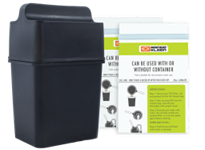 Bags
Bags 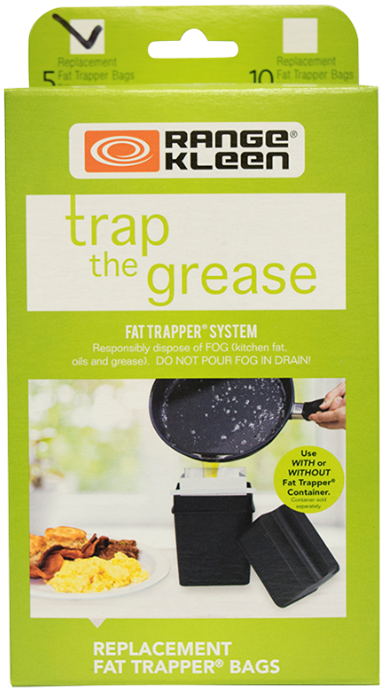
Use 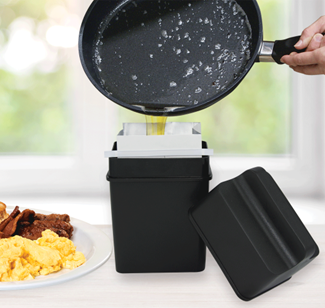
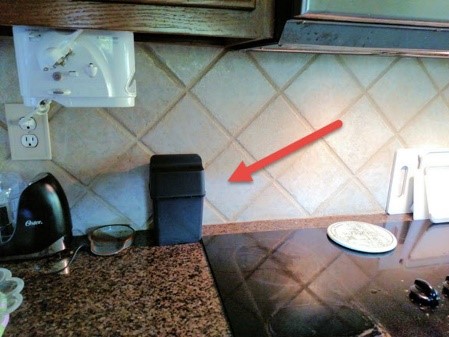
Click here for the FOG (kitchen fat, oils, & grease) pdf
We are going from STOP the GREASE BLOB 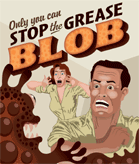
in 2010 to Stop the FROG 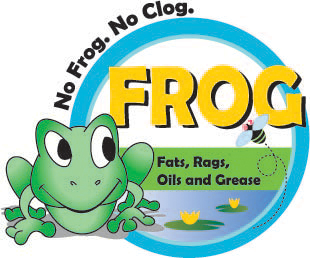 in 2021!
in 2021!
The objective is still the same, preventing problems for our homes.
The Village of Ashville is excited to announce the launch of a new initiative designed to help mitigate the amount of grease discharged into our sanitary sewer system. Fats, Rags, Oil, and Grease (FROG) create hazardous and costly issues for residents, business owners, and village resources by generating blockages in sewer mains and lateral. Equipment can break if these items reach a Lift Station, Force Main Pump, or Water Resource Recovery Facility Pump.
For Residents - How can you help?
-
Scrape left over food in the trash and avoid using a garbage disposal.
-
DO NOT pour hot grease down the drain. Let it cool and dispose of it in the trash.
-
Make sure rinse water does not exceed 140° F.
-
Clean up any spills with paper towels and dispose of them in the trash.
-
Only flush toilet paper – Disposable Wipes, feminine hygiene products, and everything else does not belong in the sewer.
For Businesses
The FROG program will consist of inspecting grease traps/grease interceptors, reviewing standard operating procedures, and ensuring best management practices (BMP) are being followed to prevent grease from entering sewers. You will be contacted by the Village of Ashville to schedule the initial inspection of your equipment and BMPs. If an appointment is not scheduled, then, per ordinance, the Village will visit your business at a time that is convenient for our staff.
The following are forms and information you can use:
Do Not Pour Grease Down Drains
Food Service Establishment BMPs
Food Service Employee Training Checklist
Village of Ashville’s Code of Ordinances regarding FRO
If you have any questions, please contact the Chief of Wastewater Operations, Adam Kehoe, This email address is being protected from spambots. You need JavaScript enabled to view it. 614-402-9875.
Storm drains prevent flooding by conveying rainwater away from houses and roads and discharge to a stream or lake. The wastewater transports pollutants causing detrimental effects to aquatic and plant life and the people using these waters for recreational purposes. A blockage in a homeowner’s line can be damaging as well. If a plug occurs due to FROG, the sewage leaving the home can back-up and overflow into basements or other areas of the house causing an unsafe environment for your family. This program was initiated to continue to provide the residents of Ashville a clean and safe environment to live, work, and play. Prevention is key when addressing FROG and the most cost-effective way to manage its impacts.
What you read is not always true
We encounter endless possibilities of purchases every day. The consumer uses different reasoning techniques to help decide in purchasing items based on affordability, quality, convenience, and service. Persuasive advertising techniques have controlled the bathroom hygiene market segment in recent years, as products sold as “flushable” have increased in popularity. Everything from disposable baby wipes to flushable toilet brushs have been sold with the assumption that these products are biodegradable and harmless. These “flushable” products can cause havoc on home sewer leads or municipal collection system infrastructure.
The item that should be flushed is regular ply toilet paper. Toilet paper is designed to break down rapidly and dissolve into almost nothing. Material which should not be flushed, but not limited to this list goes as follow: baby wipes, flushable wipes, flushable diapers, feminine hygiene products, contraceptives, cotton balls, cigarette butts, paper towel, flushable toilet wands, Q-Tips, dental floss, and all fats, rags, oils, and grease (FROGS), from page one.
For homeowners, these products have a greater possibility to get trapped in lateral leads leaving homes. Over time, these items will accumulate in the pipe until a plug has occurred, causing an unsanitary environment of raw sewage backup into households. The cost to sanitize a household because of a sewer backup can be thousands of dollars, and if not properly insured, the homeowner will be responsible for the entire amount.
A similar scenario can occur for our municipal sanitary sewer collection system. They accumulate in certain areas of the sewer until a plug happens. Along with pipes, sanitary sewer systems have pumps to elevate sewage to higher elevation, and then allow gravity to convey the sewage to wastewater plants. These items plug pumps, increasing the probability of sewer backups. As pumps are plugging, more energy is needed to operate the pumps, increasing total electrical usage. Once the pump is plugged completely, village sewer operators are required to remove the debris. Higher energy cost, contracted services, and labor means more cost that will be passed on to the consumer. To control these cost, remember to only flush toilet paper and disregard flushable wipes properly in trash receptacles. Thank you for reducing our cost and protecting the environment!
You can do your part by following some the simple grease do’s and dont's.
Don't pour grease down the sink or garbage disposal.
Don't run hot water along with the fats, oil and grease doesn’t help!
No amount of hot water keeps grease from eventually congealing. This only gets the grease through the part of the pipes in your home. Once it goes into the sewer and cools, it sticks to the walls of the pipes and creates an expensive and messy problem of sewer backups - for you, for your neighbors and for the creeks and rivers in your neighborhood.
Do reduce, reuse, and recycle. Put used fat, oil and grease in a foiled lined bag, such as a foiled coffee bag or a used soup or vegetable can. If you generate Greaselarge amounts of used cooking oil such as used when frying turkeys, reuse or recycle it.
Grease can completely block sewer pipe, as shown below.
Picture provided by the Bureau of Environmental Services, Portland, Oregon
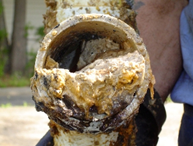
On September 1, 2010 the following notice was sent to residents north of State Route 752.
 ssssfklsdjfk
ssssfklsdjfk